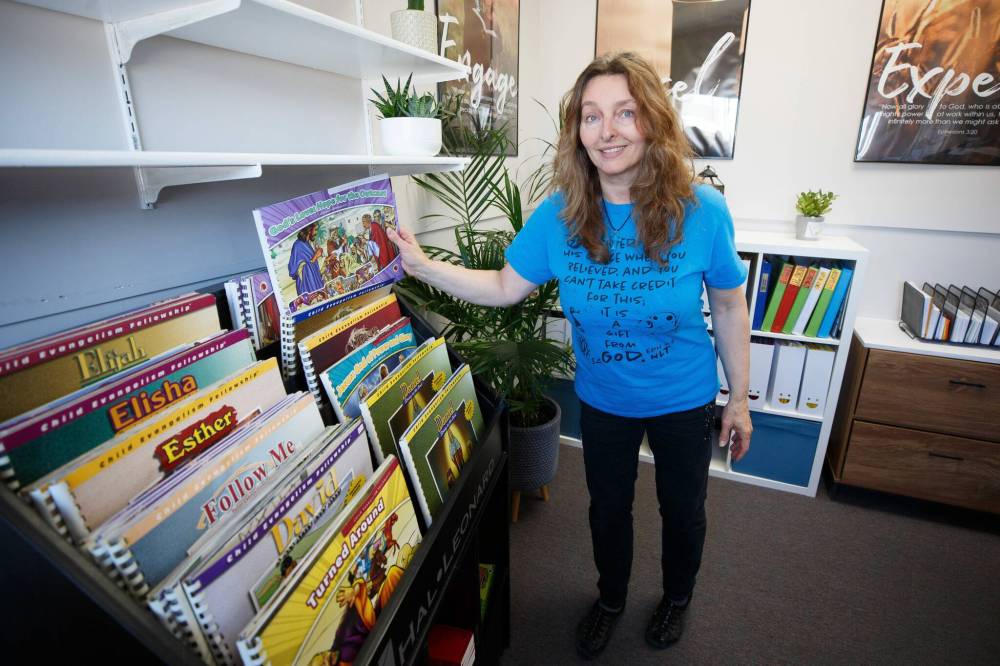Religious class shouldn’t get blessing
Advertisement
Read this article for free:
or
Already have an account? Log in here »
To continue reading, please subscribe:
Monthly Digital Subscription
$1 per week for 24 weeks*
- Enjoy unlimited reading on winnipegfreepress.com
- Read the E-Edition, our digital replica newspaper
- Access News Break, our award-winning app
- Play interactive puzzles
*Billed as $4.00 plus GST every four weeks. After 24 weeks, price increases to the regular rate of $19.00 plus GST every four weeks. Offer available to new and qualified returning subscribers only. Cancel any time.
Monthly Digital Subscription
$4.75/week*
- Enjoy unlimited reading on winnipegfreepress.com
- Read the E-Edition, our digital replica newspaper
- Access News Break, our award-winning app
- Play interactive puzzles
*Billed as $19 plus GST every four weeks. Cancel any time.
To continue reading, please subscribe:
Add Free Press access to your Brandon Sun subscription for only an additional
$1 for the first 4 weeks*
*Your next subscription payment will increase by $1.00 and you will be charged $16.99 plus GST for four weeks. After four weeks, your payment will increase to $23.99 plus GST every four weeks.
Read unlimited articles for free today:
or
Already have an account? Log in here »
Hey there, time traveller!
This article was published 29/05/2023 (873 days ago), so information in it may no longer be current.
For generations, citizens of democratic nations have negotiated a sometimes-fraught tension in the boundaries between the authority of the state, and that of religious leaders.
The separation of church and state is generally maintained. However, recent events in Winnipeg have brought to light the fact that in Manitoba, the boundary is surprisingly porous.
Silver Heights families have requested that the community’s public school make room for a program that would allow children to participate in Christian lessons during the day. The elementary-aged theology program would be opt-in, and would include Bible study and instruction on the history of holidays such as Christmas and Easter. The program itself would be administered by the Child Evangelism Fellowship, which operates in a number of Steinbach-area schools.

Mike Deal / Winnipeg Free Press files
Laura Lawrence, Discovery Time director, with a selection of education material at Child Evangelism Fellowship of Manitoba.
This effort is above board because, as it turns out, the existence of such programs in a Manitoba public school is made possible via obscure legislation which is still on the books after its implementation in the 19th century.
So, in fairness to parents and the school division, this is something they have the right to request and they have done so. The school board, per Free Press reports, is expected to approve the move at its next meeting.
However, this event offers Manitobans an opportunity to give serious consideration to where the boundaries between church and state are, and what role exactly a public school is meant to serve.
Canada is a multicultural nation. As such, its educational institutions cannot be places of religious instruction in the style of a Sunday school. Religious studies is another matter — a strong case could be made that young Manitobans would benefit from the opportunity to study the histories of world religions from an academic perspective.
But for a public school to offer church-like religious teaching is not only in violation of the ideal of neutral, public institutions, it courts disaster.
Matters of the spirit are deeply personal and sensitive, and there is much in history to attest to conflict of varying degrees, from simmering tension to outright warfare, over religious differences.
Though the program may not be mandatory, it is difficult not to look at it and see a beachhead through which parents of one faith can proselytize to others. Parents who hold different religious faiths — or who have no religious beliefs at all — could hardly be blamed for viewing the idea with suspicion.
Further, the law makes no provision for only allowing one religion to host such a program. Theoretically, any school could make space for any faith within its walls. If trustees approve them all, then we have public schools struggling to be multi-faith religious centres and also secular educational facilities.
Or, if trustees allow one faith and deny others, we have a serious problem of imbalance, unnecessarily stoking resentment and mistrust from those left out of the mix.
The solution to this conundrum is simple: repeal the legal provision, and re-establish schools as purely secular, public institutions in which children learn literacy, math, history, art and so on. This way, everyone is offered the same opportunity for religious instruction at school — none — regardless of faith.
Religious communities already have dedicated places — their respective temples — through which they can teach their children in the faith. Such teaching is the place of the churches, mosques, synagogues, and other temples where Manitobans worship.
For the sake of the neutrality of our public institutions, schools have to be left out of it.
History
Updated on Monday, May 29, 2023 7:18 AM CDT: Adds photo
Updated on Monday, May 29, 2023 7:22 AM CDT: Adds preview text


